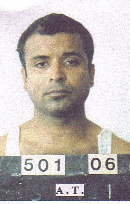A mechanism is in place for Guyana to garner information from the US on that country’s investigation into the workings of convicted drug trafficker Shaheed ‘Roger’ Khan.

Guyana and the US are both signatories to a multilateral treaty — the Inter-American Convention of Mutual Assistance in Criminal Matters — which sets out the procedure that should be followed when signing states are requesting information from each other on criminal matters.
US authorities had said that Khan was a principal player in the drug trade in Guyana and the key supplier of a Guyanese drug trafficking organisation based in Queens, New York which is said to have distributed hundreds of kilos of cocaine in a two-month period during the spring of 2003.
Following Khan’s sentencing to 15 years in federal prison on October 16, Commissioner of Police Henry Greene told reporters that the local police hoped to get the evidence from his case from US authorities. Greene said that the police had earlier communicated with the US embassy about access to evidence used in the US court, but had been told that they had to wait until the trial was completed.
However, according to the Organisation of American States (OAS) treaty, the US has designated the Office of International Affairs of the Criminal Division of the United States Department of Justice as the authority to contact whenever states are requesting information on criminal matters.
Guyana signed the treaty in 2006 and ratified it last year, but does not state its designated authority for requesting information on criminal matters. Of the 25 OAS member states that have signed and ratified the treaty, ten have listed either their Ministry of Home Affairs or Ministry of Foreign Affairs or equivalent as the designated authority.
Contacted, Minister of Foreign Affairs Carolyn Rodrigues-Birkett told Stabroek News that the Ministry of Home Affairs has been designated to make and receive such requests. Therefore, a request for information from the US authorities would have to be made by Home Affairs Minister Clement Rohee to the US Justice Department and not to the US Embassy.
According to the treaty, the central authority is responsible for issuing and receiving requests for assistance and shall communicate directly with others for all purposes.
According to Chapter 4, Article 24 of the treaty, when a request is made in accordance with the domestic procedure of the state from which the request is made, that state shall make available to the requesting state a copy of the public documents, records, or information held by the government agencies or departments of the requested state.
“The requested state may make available copies of any document, record, or other information held by a government agency or department of that state that is not public in nature, to the same extent as and subject to the same conditions under which they would be made available to its own judicial authorities or to others responsible for application of the law. The requested state, at its own discretion, may deny, in whole or in part, any request made under the provisions of this paragraph,” the treaty said.
By signing the treaty the countries undertook to render to one another mutual assistance in investigations, prosecutions, and proceedings that pertain to crimes over which the requesting state has jurisdiction at the time the assistance is requested.
However, the convention does not authorize any state party to undertake, in the territory of another state party, the exercise of jurisdiction or the performance of functions that are placed within the exclusive purview of the authorities of that other party by its domestic law.
The convention applies solely to the provision of mutual assistance among state parties. Its provisions shall not create any right on the part of any private person to obtain or exclude any evidence or to impede execution of any request for assistance.
President Bharrat Jagdeo has refused to accede to the call of the opposition parties for an inquiry into Khan’s activities in Guyana, but has said that the Guyana Police Force is the authority to investigate any criminal offences Khan may have committed in Guyana.
And on Tuesday last, the police announced that they would investigate the murders connected to Khan and Rondell ‘Fineman’ Rawlins and any other gang-related murders and asked members of the public and groups to contact the Criminal Investigation Department (CID) with any information they have on those murders.
Khan has been accused of having links to the government and creating havoc as head of the violent ‘Phantom Squad’, which is said to be responsible for a number of unsolved deaths here. US authorities have said that according to witnesses, Khan was responsible for the murders of Ronald Waddell, Donald Alison and Dave Persaud, among others.
Greene said last week that while the police have files on the murders of Waddell and Allison they have no evidence.





